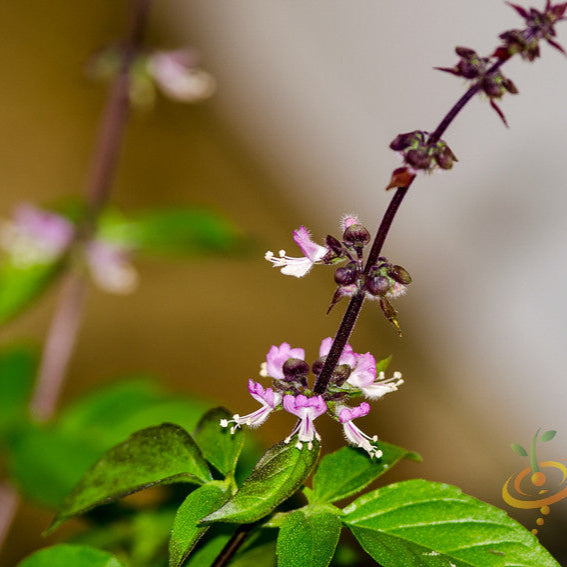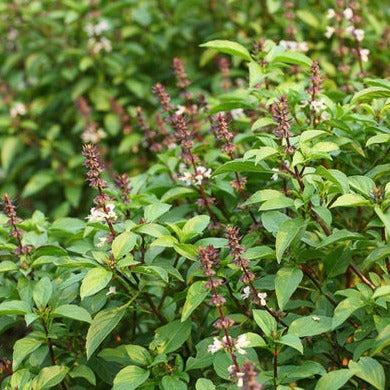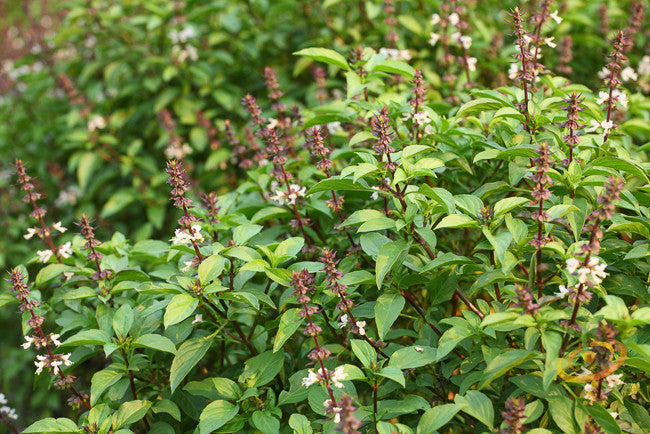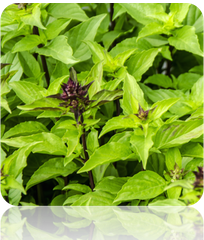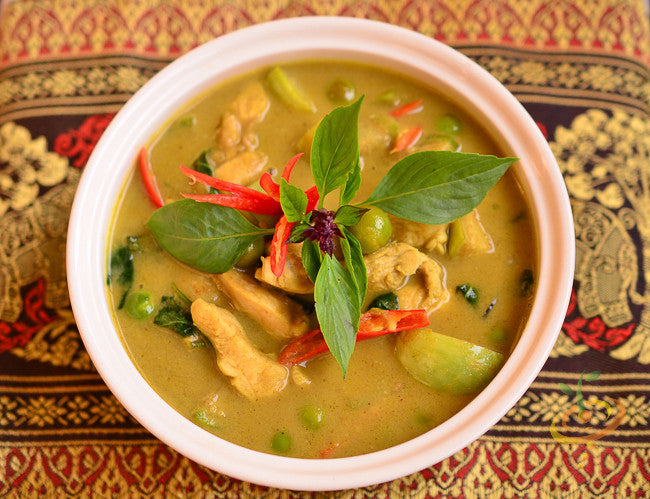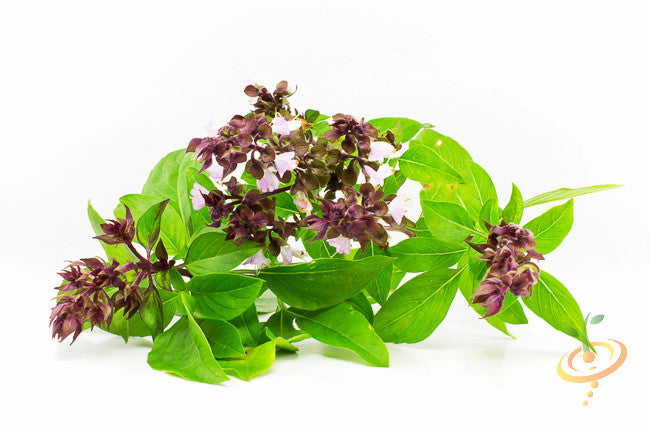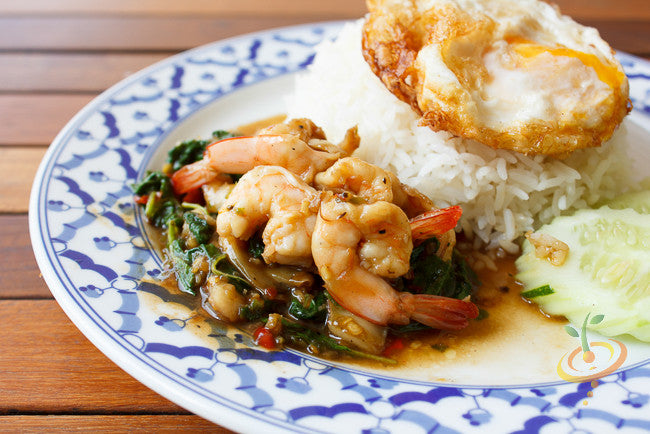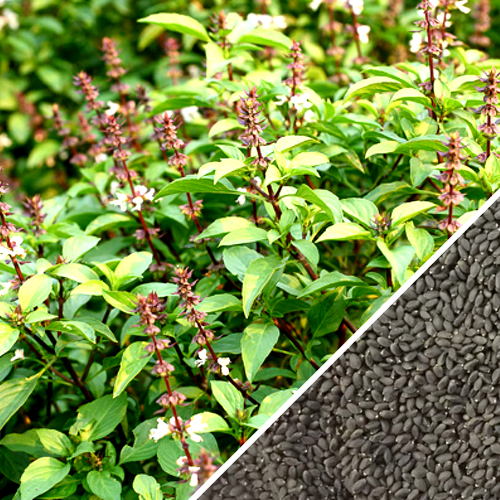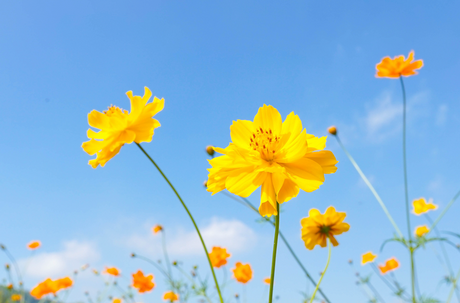Basil, Thai
Add this item to your cart
| Subtotal | |||
|---|---|---|---|

|
Sampler Pack (Appx. 50 seeds)
$399
|
||

|
Large Pack (Appx. 500 seeds)
$999
|
||
Description
Description
Thai Basil has small sturdy leaves that hold up well to high-heat cooking, purple stems, and delicate, edible violet flower spikes that make the whole plant look like a lavender bush when allowed to fully bloom.
The spicy clove-anise flavor brings an earthy essence to pesto, Thai curries, stir fries, citrus salads, and cocktails. Elegant in cut flower arrangements, too.
Harvest the leaves and stems from the top part of the plant, and pinch off edible flower buds as they appear, which prevents the leaves from turning bitter, and signals the plant to branch out and grow more leaves, making a bushier plant.
The more you harvest, the more it grows!
- Spicy clove-anise flavor
- Culinary, medicinal, and ornamental
- Good for indoor gardens
- Good for containers
- Tons of medicinal benefits!
As a medicinal herb, Basil has been used internally to treat anxiety, colds, colic, cough, depression, diarrhea, fever, flatulence, flu, indigestion, insomnia, intestinal parasites and worms, exhaustion, gastric pain, gonorrhea, lactation problems, migraine headache, nausea, stomach cramps, sore throat, and vomiting, and externally to treat acne, insect bites and stings, loss of smell, skin problems, snake bites.
⚠️ Do not use medicinally while pregnant.
⚠️ Medicinal properties are presented as information only, and are not a recommendation or prescription for use. Consult a medical professional before using any herb medicinally.
As a companion plant, it attracts hummingbirds, pollinators, and beneficial insects, and repels asparagus beetles, cabbage moths, cabbage white butterfly, cabbage worms, carrot rust fly, flies, maggots, mice, mosquitoes, spider mites, thrips, and tomato hornworms.
| Shop all Basil Seeds | Shop Good Companion Plants for Basil | 📚 Grow Guide: Basil |
Thai Basil is very fragrant and one of the most available varieties of basil. It has beautiful purple stems with bright green leaves. It is used widely in soups and curries, and other traditional Thai dishes.


What is Thai Basil?
Thai Basil exhibits narrow leaves, with gorgeous purple stems. Sometimes mauve or pink-ish flowers. It needs warm air and sun to do well. This is a wonderful basil to grow if you are a Thai food enthusiast! It is also known as the "holy herb" in many traditions all around the world.
Health Benefits of Thai Basil
Thai Basil is a wonderful blood coagulant, and plays a role in strengthening bones. It contains a ton of iron, vitamin A, and plenty of essential oils.

Ways to Consume Thai Basil
Use Thai Basil as a condiment, or a enjoy it as an accompaniment to Pho'. It is slightly anise-flavored so it goes extremely well in soups and curries.
![]()
See Basil Recipes & Growing Tips on our Pinterest Board
| Shop all Basil Seeds | Shop Good Companion Plants for Basil | 📚 Grow Guide: Basil |
Description
Description
Thai Basil has small sturdy leaves that hold up well to high-heat cooking, purple stems, and delicate, edible violet flower spikes that make the whole plant look like a lavender bush when allowed to fully bloom.
The spicy clove-anise flavor brings an earthy essence to pesto, Thai curries, stir fries, citrus salads, and cocktails. Elegant in cut flower arrangements, too.
Harvest the leaves and stems from the top part of the plant, and pinch off edible flower buds as they appear, which prevents the leaves from turning bitter, and signals the plant to branch out and grow more leaves, making a bushier plant.
The more you harvest, the more it grows!
- Spicy clove-anise flavor
- Culinary, medicinal, and ornamental
- Good for indoor gardens
- Good for containers
- Tons of medicinal benefits!
As a medicinal herb, Basil has been used internally to treat anxiety, colds, colic, cough, depression, diarrhea, fever, flatulence, flu, indigestion, insomnia, intestinal parasites and worms, exhaustion, gastric pain, gonorrhea, lactation problems, migraine headache, nausea, stomach cramps, sore throat, and vomiting, and externally to treat acne, insect bites and stings, loss of smell, skin problems, snake bites.
⚠️ Do not use medicinally while pregnant.
⚠️ Medicinal properties are presented as information only, and are not a recommendation or prescription for use. Consult a medical professional before using any herb medicinally.
As a companion plant, it attracts hummingbirds, pollinators, and beneficial insects, and repels asparagus beetles, cabbage moths, cabbage white butterfly, cabbage worms, carrot rust fly, flies, maggots, mice, mosquitoes, spider mites, thrips, and tomato hornworms.
| Shop all Basil Seeds | Shop Good Companion Plants for Basil | 📚 Grow Guide: Basil |
Thai Basil is very fragrant and one of the most available varieties of basil. It has beautiful purple stems with bright green leaves. It is used widely in soups and curries, and other traditional Thai dishes.


What is Thai Basil?
Thai Basil exhibits narrow leaves, with gorgeous purple stems. Sometimes mauve or pink-ish flowers. It needs warm air and sun to do well. This is a wonderful basil to grow if you are a Thai food enthusiast! It is also known as the "holy herb" in many traditions all around the world.
Health Benefits of Thai Basil
Thai Basil is a wonderful blood coagulant, and plays a role in strengthening bones. It contains a ton of iron, vitamin A, and plenty of essential oils.

Ways to Consume Thai Basil
Use Thai Basil as a condiment, or a enjoy it as an accompaniment to Pho'. It is slightly anise-flavored so it goes extremely well in soups and curries.
![]()
See Basil Recipes & Growing Tips on our Pinterest Board
| Shop all Basil Seeds | Shop Good Companion Plants for Basil | 📚 Grow Guide: Basil |
FAQs
FAQs
| Where can you ship your seeds to? |
|
| How much is shipping across the USA? |
|
| How do you ship your seeds? |
|
| What is a Seed Bank? |
|
| Are all your seeds NON-Genetically Modified (Non-GMO)? |
|
| Are all your seeds Organic? |
|
| What do you mean by growing Organic food? |
|
| What is a Genetically Modified seed? |
|
| What does it mean when you say the seeds are Non-Hybrid and Open-Pollinated? |
|
| Do you accept returns? |
|
| Can I collect my seeds after harvest? |
|
| How many years will my seeds last? |
|
About Our Seeds
About Our Seeds

|
GMO-FREE We also offer a few hybrid varieties on this website and they will be labeled as such on product listing. |

|
|
|
MOISTURE-PROOF PACKAGING All our seeds are packaged in high quality re-sealable moisture-proof packs designed to protect & extend the shelf-life of your seeds. We do NOT use paper envelopes. Read frequently asked questions |
 |
|
|
5-STAR CUSTOMER SUPPORT |
 |
|
|
SATISFACTION. GUARANTEED. |
 |
|
|
HIGHEST QUALITY SEEDS |

|
|
|
TOTALLY RAW & UN-TREATED |

|
Know where your food comes from.
Support local growers.
Grow your own Organic/GMO-FREE food!
Useful Links: [What is GMO?] [Step-by-Step Grow Guides] [Safe Seed Pledge] [FAQs]
WE DO NOT GROW OR SELL SEEDS FROM MONSANTO OR ANY OTHER COMPANY THAT IS AFFILIATED WITH GMO.
✓ NON-GMO
✓ HEIRLOOM
✓ OPEN-POLLINATED (OP)
✓ RAW, NATURAL & UN-TREATED
Safe Seed Pledge
Safe Seed Pledge
OUR PLEDGE TO YOU
Agriculture and seeds provide the basis upon which our lives depend. We must protect this foundation as a safe and genetically stable source for future generations.
For the benefit of all farmers, gardeners and consumers who want an alternative. We pledge to you that we do not knowingly buy or sell genetically engineered seeds or plants. The mechanical transfer of genetic material outside of natural reproductive methods and between genera, families or kingdoms, poses great biological risks as well as economic, political, and cultural threats.
We wish to support agricultural progress that leads to healthier soils, genetically diverse agricultural ecosystems and ultimately healthy people and communities.
We do not buy - OR - grow any seed from large corporations that make Genetically Engineered seeds. We don't touch that stuff and we never will.
The seeds we offer aren't like varieties you'd typically find at a garden center.
Every variety we offer is 100% OP (open-pollinated). Open-pollination means that you can safely save the seed after harvest and preserve a collection of heirloom seed for many generations to come.
To make it perfectly clear ... Our seeds do not contain any exogenously inserted embryogenesis deactivator genes caused by human intervention.
⭐⭐⭐⭐⭐
Highest Quality Seed, Guaranteed
We now accept the following payment methods
We are proud to offer the highest quality seeds to plant in your organic vegetable garden. All seeds have been tested to have purity -&- germination rates above industry standards. Our seed packets are designed to be water-proof, re-sealable -&- freezer-safe for long-term storage.
continue shopping
🌱 Featured Seed Types (A - Z)
Go to the seed shopcontinue shopping

